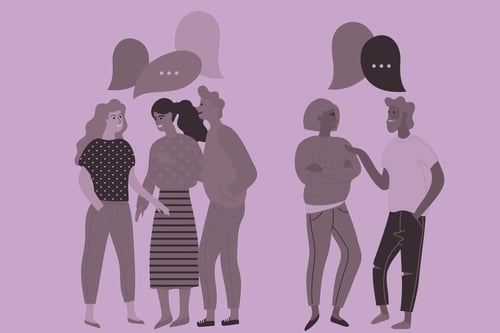The Pathway to Excellence | Live | Family and Friends
Friendship Groups
We need to adopt an approach to establishing and maintaining constructive friendship groups – how we go about identifying and caring for friends and acquaintances of good character who bring to our relationships the values, beliefs, and structure that create an environment of trust and reciprocity in which all might grow to fulfil the potential and to do what is good and right in our lives.

Many of us often talk about how we are defined by those around us. The reason we do this is because, to one extent or another, it’s true. In fact, our immediate and continued exposure to everything around us plays a role in defining the person we are and the person we will become. For this reason, the process of choosing the people we surround ourselves with should be very important to us. Having friends around us that support, inspire and build us up to become a better person is one of life's greatest joys. It’s something that we all deserve.
Healthy, meaningful, and fulfilling relationships with our friends plays a fundamental role in our health and wellness, as well as providing us companionship and contentedness in our everyday lives. Two of the fundamental components of any relationship are communication and trust. Communication is as much about being a good listener as it is about being able to share our feelings, opinions, and beliefs. Trust is based around believing in the reliability and capacity of our friends to be there when we need them. It helps us to feel comfortable bringing our problems to them and asking for help. Debating the validity of our opinions, beliefs, and predictions in a healthy and supportive environment is another gift of friendship. Through stories, laughter, and memories, our shared moments will help us to consolidate what we know. They will teach us about how others view, judge and value different areas of life, and from this diversity of experience we can grow further. In this way, our friendship groups need to be as much about difference as they are about similarity; they need to challenge us as well as nurture us.
“There is a magnet in your heart that will attract true friends. That magnet is unselfishness, thinking of others first; when you learn to live for others, they will live for you.”
Paramahansa Yogananda
Our friendship groups, therefore, need to evolve over time. We need to be kind in our everyday life towards all people whose paths we cross. As we seek to enrich the lives of others and, in turn, benefit from what they bring to our own lives in terms of emotional and interpersonal growth, we should avoid, as best as we can, moving through the world judging people before we know them well. We need to keep an open mind about the possibility of connecting with others, learning from them, and forming friendships in the process. Thus, while we should hold those close to us near, we shouldn't shut others out.
While making new friends is a fluid process for some of us, for others it’s quite difficult. What is clear is that as we grow in experience, even the most painfully shy of us can build the confidence and skills to begin new friendships. The most difficult step is usually the first one, when overcoming the fear of rejection seems impossible. As with all new competencies, the advice and support of mentors who can help us rehearse and prepare for encounters in a constructive fashion should not be underestimated. It's also important for us not to judge ourselves adversely if we do find it challenging to strike up a conversation. We should believe we always have something to offer people and that what we have to offer is interesting and substantial, even if it is just a simple kindness or fleeting smile.
It’s also important that once we've made friends, we make the effort to be a good friend. Maintaining our availability, generosity, and thoughtfulness with those around us is a reciprocal need. There are times when we will need our friends and there are times when they will need us to feel supported and loved. And so it all comes down to the character of selflessness, our willingness to give of ourselves in small and big ways to those about whom we care.
We can contemplate our Friendship Groups by considering the following questions:
- Do I enjoy arguing with my friends about how best to live and what it means to flourish?
- Do I have at least one good friend whom I know would be there for me if I needed help of any sort?
- Do I go out of my way to be friendly with people who aren’t “just like me” and who help me to see the world from different perspectives?
- Do I find it easy to make new friends and to keep old ones?
- Am I someone my friends can count on if they need someone to talk to about a difficult personal issue?







